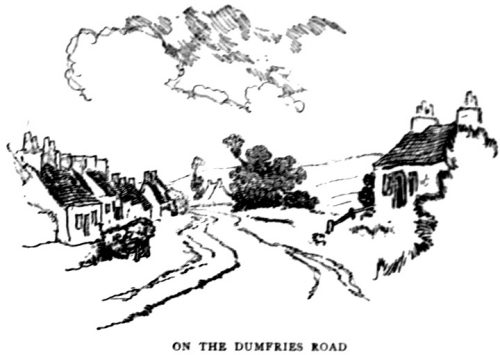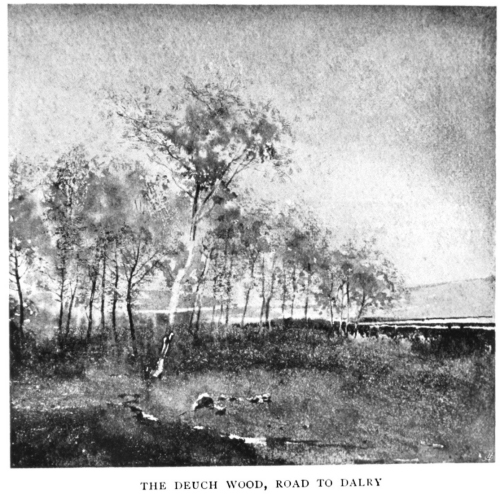|

THE GARPEL LYNN
“Bogue.”
IT was that kindly and well-beloved man, the late Mr.
Barbour of the Bogue, the son of “Cincinnatus Caledonius," the author of so
many interesting books, who first guided me to Jean's Waa's. His father was
the man who had first written down and published the now celebrated
tradition of Jean's love-trouble. The son, full of the most delightful
humour and sympathy–alas, too early cut off !–repeated the story as we
brushed through the little copses of oak and hazel which fringe Garpel-side.
It was high summer. The young broods were scattering on every side, and the
bum went murmuring on beneath as we scrambled. I think we agreed with
William Gordon the younger, who in the time of his sickness was cared for
here, that Jean's Waa's was indeed" a rare and heartsome place to bide in on
a summer's day. There was the sound of the birch singing, the plash of the
water into the pool beneath the Holy Linn, where the ministers held their
great baptizing of bairns, when the bonny bum water dropped of its own
accord on their brows as their fathers held them up. There were the leaves
rubbing against one another with a pleasant soughing noise. These (says
William Gordon) kept my heart stirring and content as long as I abode in the
Glen of the Garpel.
"There is in particular one little hill with a flat top,
from which one may spy both up and down the glen, yet remain hidden under
the leaves. Here I often frequented to go, though Sandy warned me that this
would one day be my death. Yet I liked it best of all places in the daytime,
and lay there prone on my belly for many hours together, very content, only
chewing sorrel clacking my heels together, and letting on that I was
meditating. But, indeed, I never could look at water slipping away beneath
me without letting it hear my thoughts with it, and leave me to the
dreaming. And the Garpel is an especially pleasant bum to watch thus running
away from you. I have often had the same feelings in church when the sermon
ran rippleless and even over my head.
Jean’s Waa.
“The only thing that annoyed me was when on the Sabbath
days the Garpel became a great place for lovers to convene. And above all,
at one angle behind Jean Gordon's cot, there is a bower planted with wild
flowers–pleasant and retired doubtless, for them that are equipped with a
lass.” 1
Not only cosy but safe was the abode of Jean Gordon in
these perilous times and it was sitting on a stone, near that very Lovers'
Bower, that Mr. Barbour told me over again the Tale of Jean's Waa's and of
the faithless wooer who gaed up the Iang glen of the Ken–alas, never to
return.
“The cottage sat bonnily on the brink of a glen, and Almost
from my very window began the steep and precipitous descent. So that if the
alarm were suddenly given, there was at least a chance of flinging myself
out of the window and dropping into the tangled sides of the Linn of Garpel.
The
1 “The Men of he Moss-Hags,” p. 237 (Ibister & Co.)

thought of the comfort of Jean's cot made me the more willing
to take the risk. For I knew well that if I had to venture the damps and
chills of the glen without any shelter after my illness, it would fare but
poorly with me. So all that night I lay and listened to the murmur of the
water beneath, dashing about the great upstanding rocks in the channel.
“But other sound there was none, and to this sweet
sequestered spot came no one to seek us.
“Here in the fastnesses of the Garpel, Sandy and I abode
many days. And though the glen was searched, and patrol parties more than
once came our way, not one of them approached near the fastness of thickets
where in the daytime we were hidden. And each night, in all safety, I betook
me to the cottage of Jean Gordon.
"Jean's story has been a sad one, but she made little of it
now, though it was well known to all the country side."
“’The Lord has taken away the stang of pain out of my
life,' she said. 'I was but a lass when I came to the Garpel, thinking my
heart broken. Yince I loved a braw lad, bonny to look upon–and he loved me,
or I was the mair deceived. Lindsay was his name. Doubtless ye have heard
the common tale. He slighted my love and left me without a word. Waes me,
but the very lift turned black when I heard it, and I cried out on the liars
that said the like I But belief came slowly to me. The loch is very near to
the Shirmers where at that time I dwelt, and the window looks down into the
black deeps from among the ivy bushes on the wall. My thoughts ofttimes
turned on that short and easy road to peace. But praise be to His marvellous
name, I saw another way. So I biggit me this bit cottage on the bonny birk-grown
sides of the Garpel, and e'en came my ways to bide here.
“’Ye'll sune get a man, for ye're bonny! Never fash your
thumb for Lindsay! ' said my kin.
“’I'll get one man,' I threepit to them. ‘What one slighted
shall never be given to another!' So forty year have I bidden here, and
heard little but the mavis sing and the cushie complain. Think weel o' yesel',
Willie lad, for ye are the first man body that has ever bidden the nicht
within Jean's Waa's. Sandy, great as he thinks himsel', can tak' the
Linnside for it. He is weather-seasoned like the red tod o' the hills; but
ye are shilpit and silly, boy William, so ye had best bide wi' auld Jean
when ye can." 1
1 “The Men of the Moss-Hags," p. 230. (Isbister & Co.)
|

